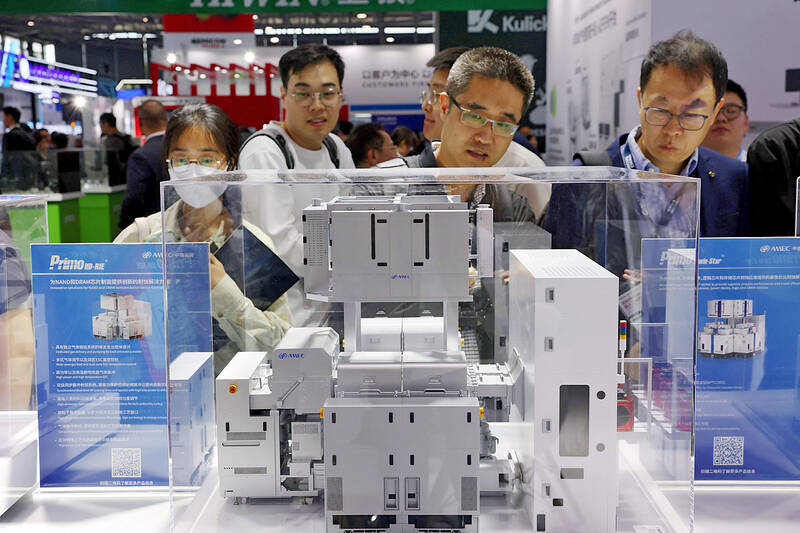Semiconductor equipment billings in Taiwan are expected to double this year, as manufacturers in the industry are keen to expand production to meet strong global demand for artificial intelligence applications, according to SEMI, which represents companies in the electronics manufacturing and design supply chain.
Speaking at a news conference before the opening of Semicon Taiwan trade show tomorrow, SEMI director of industry research and statistics Clark Tseng (曾瑞榆) said semiconductor equipment billings in Taiwan are expected to grow by an annual 100 percent this year, beating an earlier estimate of 70 percent growth.
He said that Taiwan received a boost from a large-scale investment in artificial intelligence (AI)-related semiconductors, especially in graphics processing units and high-bandwidth memory, posting the strongest growth in the world.

Photo: AFP
In the first seven months of the year, semiconductor equipment billings in Taiwan soared 134 percent from a year earlier, Tseng said.
South Korea is also benefiting from AI development, as evidenced by its report of a 38 percent year-on-year increase in semiconductor equipment billings in the seven-month period, he said.
China, meanwhile, saw an 11 percent year-on-year decline due to a relatively high comparison base in the previous year, Tseng said.
Worldwide, semiconductor equipment billings are estimated to grow by an annual 7-10 percent this year, with wafer equipment recording 6-7 percent growth, integrated circuit (IC) testing 23 percent, and assembly equipment 8 percent, he said.
Equipment to produce chips made on the 7 nanometer process and more advanced technologies, as well as memory chips, are expected to account for about 40 percent of the total global billings this year, Tseng said.
He forecast that the ratio will rise further to 45 percent in 2027, and 55 percent in 2030.
At the news conference, Tien Wu (吳田玉), chief operating officer of IC packaging and testing services provider ASE Technology Holding Co (日月光投控), said that while the global semiconductor value chain will undergo restructuring over the next decade, Taiwan’s semiconductor industry is expected to maintain its technology lead in the fields of AI and data center development by a margin of two to three years.
The Semicon Taiwan, which SEMI describes as the “Olympics of the semiconductor industry,” is expected to draw a record 1,200 enterprises from 56 countries this year. They will showcase their innovations at over 4,100 booths, attracting a record 100,000 visitors, according to SEMI.

RUN IT BACK: A succesful first project working with hyperscalers to design chips encouraged MediaTek to start a second project, aiming to hit stride in 2028 MediaTek Inc (聯發科), the world’s biggest smartphone chip supplier, yesterday said it is engaging a second hyperscaler to help design artificial intelligence (AI) accelerators used in data centers following a similar project expected to generate revenue streams soon. The first AI accelerator project is to bring in US$1 billion revenue next year and several billion US dollars more in 2027, MediaTek chief executive officer Rick Tsai (蔡力行) told a virtual investor conference yesterday. The second AI accelerator project is expected to contribute to revenue beginning in 2028, Tsai said. MediaTek yesterday raised its revenue forecast for the global AI accelerator used

TEMPORARY TRUCE: China has made concessions to ease rare earth trade controls, among others, while Washington holds fire on a 100% tariff on all Chinese goods China is effectively suspending implementation of additional export controls on rare earth metals and terminating investigations targeting US companies in the semiconductor supply chain, the White House announced. The White House on Saturday issued a fact sheet outlining some details of the trade pact agreed to earlier in the week by US President Donald Trump and Chinese President Xi Jinping (習近平) that aimed to ease tensions between the world’s two largest economies. Under the deal, China is to issue general licenses valid for exports of rare earths, gallium, germanium, antimony and graphite “for the benefit of US end users and their suppliers

Dutch chipmaker Nexperia BV’s China unit yesterday said that it had established sufficient inventories of finished goods and works-in-progress, and that its supply chain remained secure and stable after its parent halted wafer supplies. The Dutch company suspended supplies of wafers to its Chinese assembly plant a week ago, calling it “a direct consequence of the local management’s recent failure to comply with the agreed contractual payment terms,” Reuters reported on Friday last week. Its China unit called Nexperia’s suspension “unilateral” and “extremely irresponsible,” adding that the Dutch parent’s claim about contractual payment was “misleading and highly deceptive,” according to a statement

Artificial intelligence (AI) giant Nvidia Corp’s most advanced chips would be reserved for US companies and kept out of China and other countries, US President Donald Trump said. During an interview that aired on Sunday on CBS’ 60 Minutes program and in comments to reporters aboard Air Force One, Trump said only US customers should have access to the top-end Blackwell chips offered by Nvidia, the world’s most valuable company by market capitalization. “The most advanced, we will not let anybody have them other than the United States,” he told CBS, echoing remarks made earlier to reporters as he returned to Washington